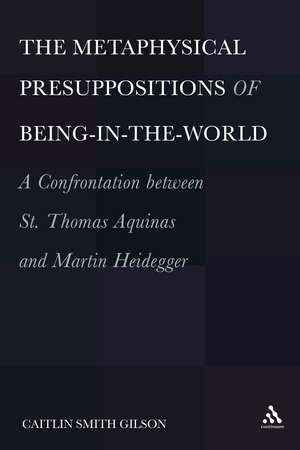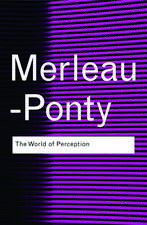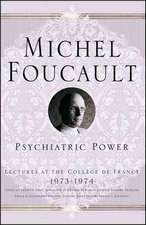The Metaphysical Presuppositions of Being-in-the-World: A Confrontation Between St. Thomas Aquinas and Martin Heidegger
Autor Dr. Caitlin Smith Gilsonen Limba Engleză Paperback – 26 oct 2011
| Toate formatele și edițiile | Preț | Express |
|---|---|---|
| Paperback (1) | 256.95 lei 6-8 săpt. | |
| Bloomsbury Publishing – 26 oct 2011 | 256.95 lei 6-8 săpt. | |
| Hardback (1) | 831.83 lei 6-8 săpt. | |
| Bloomsbury Publishing – 24 apr 2010 | 831.83 lei 6-8 săpt. |
Preț: 256.95 lei
Preț vechi: 330.91 lei
-22% Nou
Puncte Express: 385
Preț estimativ în valută:
49.17€ • 51.34$ • 40.60£
49.17€ • 51.34$ • 40.60£
Carte tipărită la comandă
Livrare economică 15-29 aprilie
Preluare comenzi: 021 569.72.76
Specificații
ISBN-13: 9781441195951
ISBN-10: 1441195955
Pagini: 236
Dimensiuni: 156 x 234 x 13 mm
Greutate: 0.34 kg
Editura: Bloomsbury Publishing
Colecția Continuum
Locul publicării:New York, United States
ISBN-10: 1441195955
Pagini: 236
Dimensiuni: 156 x 234 x 13 mm
Greutate: 0.34 kg
Editura: Bloomsbury Publishing
Colecția Continuum
Locul publicării:New York, United States
Caracteristici
An original contribution to the field which uses This book uses Heidegger's philosophy to draw out a better understanding of the importance and applicability of Thomist metaphysics in contemporary thought.
Notă biografică
Caitlin Smith Gilson is Chair of the Faculty of Philosophy at the Pontifical College Josephinum in Ohio, USA.
Cuprins
Introduction
Chapter I Parmenides, Plato & Aristotle-- An Ontological Tracing Of Intentional Being-In-The-World
Tracing I How The Deity Entered Philosophy
Tracing II Plato's Parmenides
Tracing III Aristotle's De Anima
Chapter II St. Thomas Aquinas & Classical Intentionality
A. Introduction
B. Aristotle's Critique Of Earlier First Principles
C. An Account Of The Ananke Stenai
D. Concluding Remarks: An Overview Of Aristotle's Intentional Ground And Its Onto-Epistemological Method
Chapter III The Four-Fold Reversals: The Displacement Of Being-In-The-World
A. A Brief Discursus On Heidegger's Husserlian Influence
B. Heidegger's Commentary On The Critique Of Pure Reason
C. Finitude: Nullity Or No-Thing?
D. St. Thomas' Prima Via- A Brief Discursus On The Ananke Stenai
Chapter IV The Four-Fold Intensities
A. The Necessity Of The Causal Structure
B. The Wait And Christian Philosophy
C. Intentional Presence Qua Finitude
D. Summation Of Finitude: Revisiting The Wait
E. The Aeviternal Structure Of The Intentional Presence
F. Conclusion: The Plenitude Of The Ananke Stenai
Chapter V Tragedy In The Christian Philosophic Vision
Brief Conclusive Remarks
Bibliography--Primary Sources
Bibliography--Secondary Sources
Chapter I Parmenides, Plato & Aristotle-- An Ontological Tracing Of Intentional Being-In-The-World
Tracing I How The Deity Entered Philosophy
Tracing II Plato's Parmenides
Tracing III Aristotle's De Anima
Chapter II St. Thomas Aquinas & Classical Intentionality
A. Introduction
B. Aristotle's Critique Of Earlier First Principles
C. An Account Of The Ananke Stenai
D. Concluding Remarks: An Overview Of Aristotle's Intentional Ground And Its Onto-Epistemological Method
Chapter III The Four-Fold Reversals: The Displacement Of Being-In-The-World
A. A Brief Discursus On Heidegger's Husserlian Influence
B. Heidegger's Commentary On The Critique Of Pure Reason
C. Finitude: Nullity Or No-Thing?
D. St. Thomas' Prima Via- A Brief Discursus On The Ananke Stenai
Chapter IV The Four-Fold Intensities
A. The Necessity Of The Causal Structure
B. The Wait And Christian Philosophy
C. Intentional Presence Qua Finitude
D. Summation Of Finitude: Revisiting The Wait
E. The Aeviternal Structure Of The Intentional Presence
F. Conclusion: The Plenitude Of The Ananke Stenai
Chapter V Tragedy In The Christian Philosophic Vision
Brief Conclusive Remarks
Bibliography--Primary Sources
Bibliography--Secondary Sources
Recenzii
"I am unaware of any previous successful attempt to confront Heidegger's massive critique of metaphysics at such depth and range. Dr Smith-Gilson's conception of the four-fold intentional presupposition at the heart of metaphysics is an original conception of great merit and her work will be of immense interest to scholars of Heidegger, St Thomas, and well as to epistemologists and metaphysicians across a wide spectrum."- Prof. Juan Andrés Mercado, Associate Professor of Modern Philosophy, The Pontifical University of the Holy Cross, Rome, Italy.
"This work gives a needed voice to the still-true and still misunderstood pre-modern understanding of man, world, being, and God. Where the earlier Thomistic revivals confronted modernity by employing scholastic terminology to restate its vision, Dr. Smith-Gilson's work of retrieval confronts, at the highest intellectual level, modernity and especially its phenomenological presentation, with the words of philosophy simpliciter. This work is an apologia for the Thomistic vision of man, God, and being which is not itself apologetic or defensive. This is a profound and difficult work, but one that richly rewards the reader who gives himself to its meditation." -- Herb E. Hartmann, Professor of Philosophy, Southern Catholic College, GA, USA
"The confrontation between Classical and Heideggerian understanding of Being shows Smith Gilson's superb capacity to get into the mind of philosophers of different schools of thinking and mastering their philosophical language. With great balance, this book neither merges the two in some facile reconciliation, nor makes Heidegger a straw man with which to beat modernity in favor of a 13th century theology, but highlights the similarities and differences of their conceptual frameworks, without getting stuck in terminological equivocalness. The reader will find in these rich and dense pages a sound and substantial dialog between Heidegger's philosophical standpoint and medieval metaphysics." -- Prof. Francisco Fernández Labastida, Pontificia Università della Santa Croce, Italy
"This work gives a needed voice to the still-true and still misunderstood pre-modern understanding of man, world, being, and God. Where the earlier Thomistic revivals confronted modernity by employing scholastic terminology to restate its vision, Dr. Smith-Gilson's work of retrieval confronts, at the highest intellectual level, modernity and especially its phenomenological presentation, with the words of philosophy simpliciter. This work is an apologia for the Thomistic vision of man, God, and being which is not itself apologetic or defensive. This is a profound and difficult work, but one that richly rewards the reader who gives himself to its meditation." -- Herb E. Hartmann, Professor of Philosophy, Southern Catholic College, GA, USA
"The confrontation between Classical and Heideggerian understanding of Being shows Smith Gilson's superb capacity to get into the mind of philosophers of different schools of thinking and mastering their philosophical language. With great balance, this book neither merges the two in some facile reconciliation, nor makes Heidegger a straw man with which to beat modernity in favor of a 13th century theology, but highlights the similarities and differences of their conceptual frameworks, without getting stuck in terminological equivocalness. The reader will find in these rich and dense pages a sound and substantial dialog between Heidegger's philosophical standpoint and medieval metaphysics." -- Prof. Francisco Fernández Labastida, Pontificia Università della Santa Croce, Italy


















